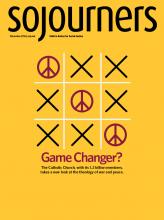LAST DECEMBER, my daughter, Zipporah—who has taken to acting out the Christmas story using our wooden nativity set—observed that our crèche was missing a “mean king” figurine. That got me to thinking: I have never seen a nativity set with a King Herod figure.
We tend to close the curtains and go home for a family dinner right after the Magi bow before Jesus with their gifts of gold, frankincense, and myrrh.
But after the Magi head home, Joseph is warned in a dream to escape Herod’s genocidal tyranny by fleeing to Egypt with his wife and child.
We don’t know how the Holy Family was treated when they reached that foreign country. Were they welcomed or feared? Did Egyptians help this vulnerable family to resettle or did local carpenters fret that Joseph might steal their jobs? Was Jesus befriended by other children or viewed as a potential disease-carrier?
Compassion for the world’s estimated 21.3 million refugees—individuals who have fled their countries because of a credible fear of persecution—competes with our own fear that the violence they flee might impact us. This polarized reaction shapes the response by the United States and others to the global refugee crisis.
Nine in 10 Protestant pastors in the United States say that, as Christians, we have a biblical responsibility to care for refugees and other foreigners based on clear biblical injunctions, according to LifeWay Research. The same survey found that only 8 percent of local churches are helping refugees—nearly half acknowledged a sense of fear in their congregations regarding the arrival of refugees.
White evangelicals, by a margin of 2-to-1, were opposed to increasing the number of Syrian refugees admitted to the U.S., according to the Pew Research Center. (A majority of white mainline Protestants were also opposed and a slim majority of Catholics and black Protestants were in favor.) It’s ironic that followers of Jesus would be so afraid of refugees, given that we worship one!
Read the Full Article

